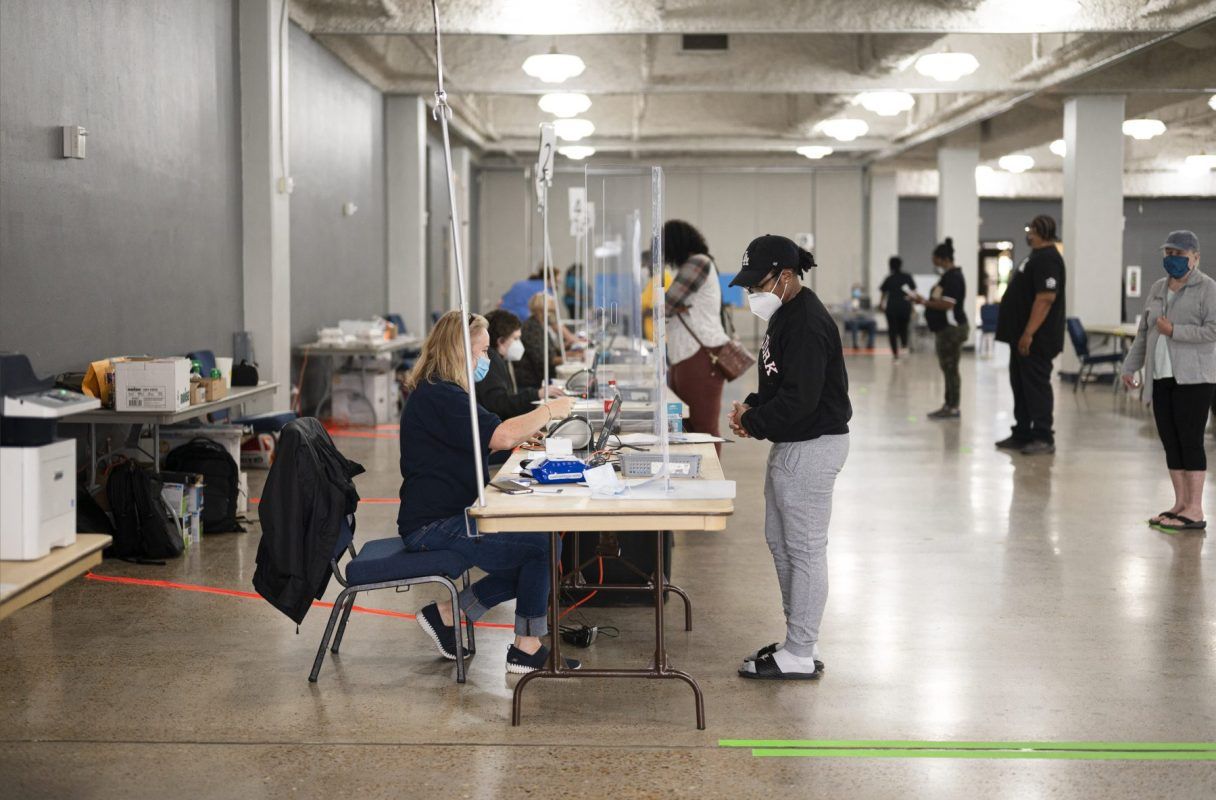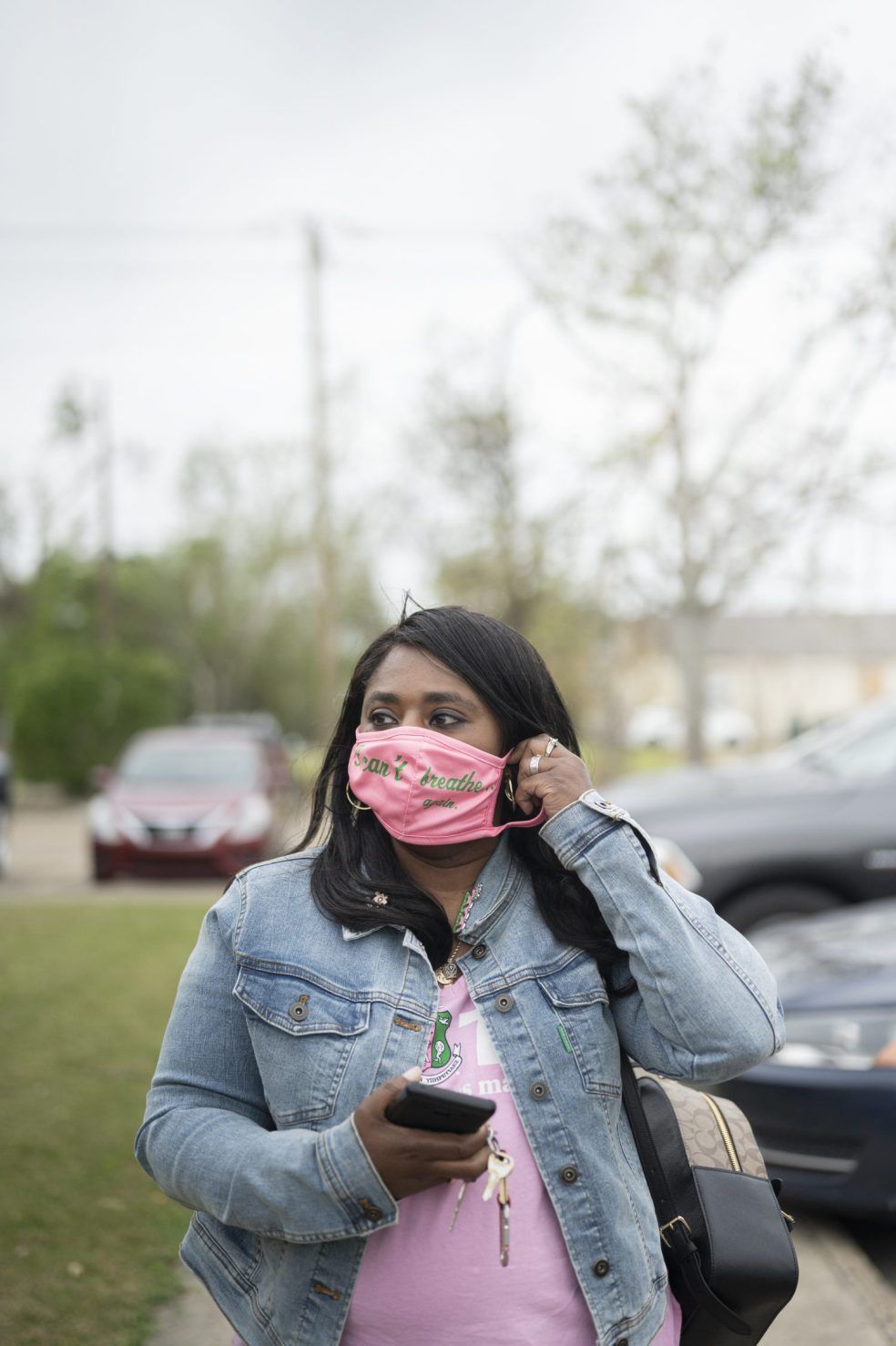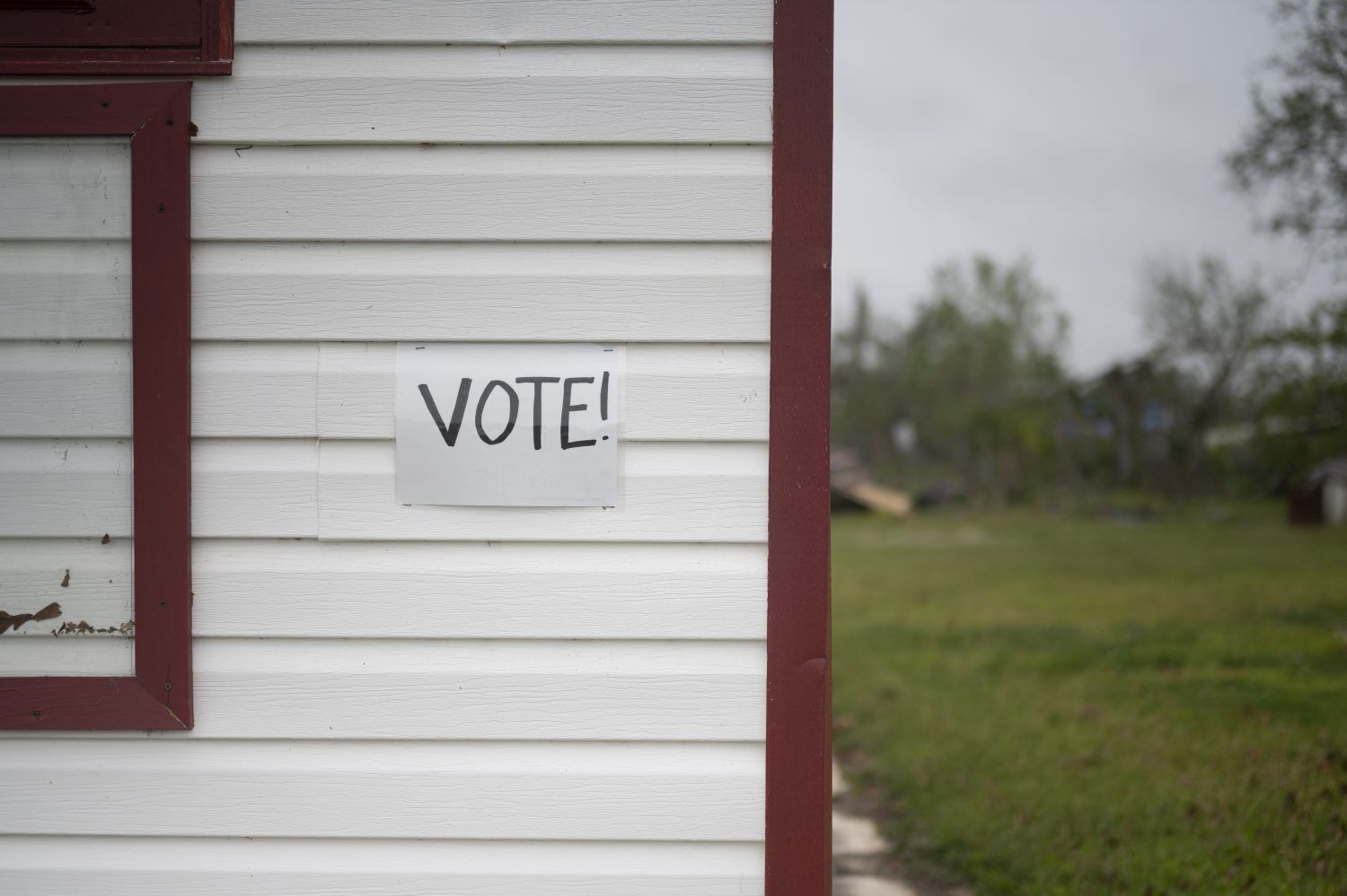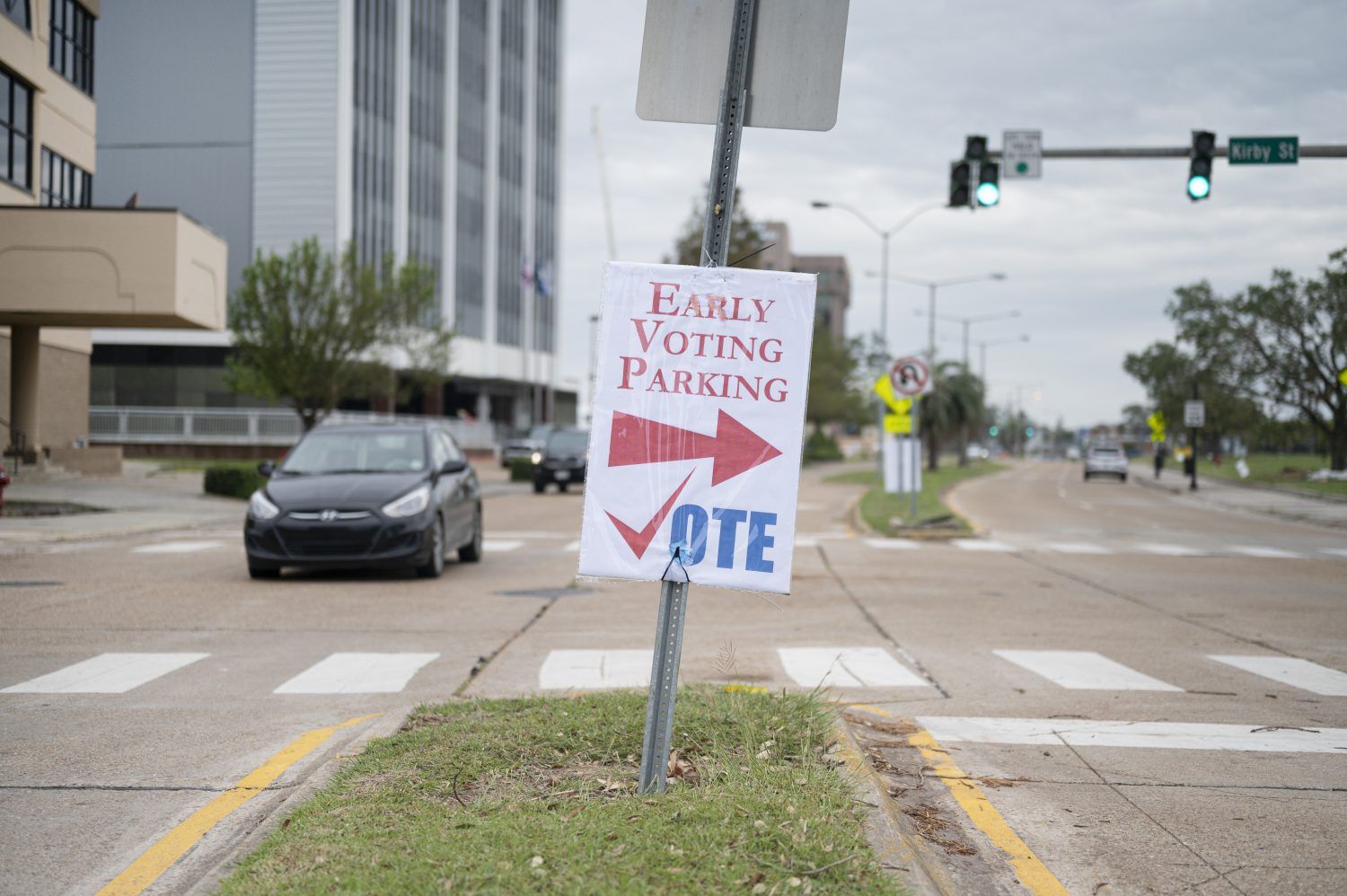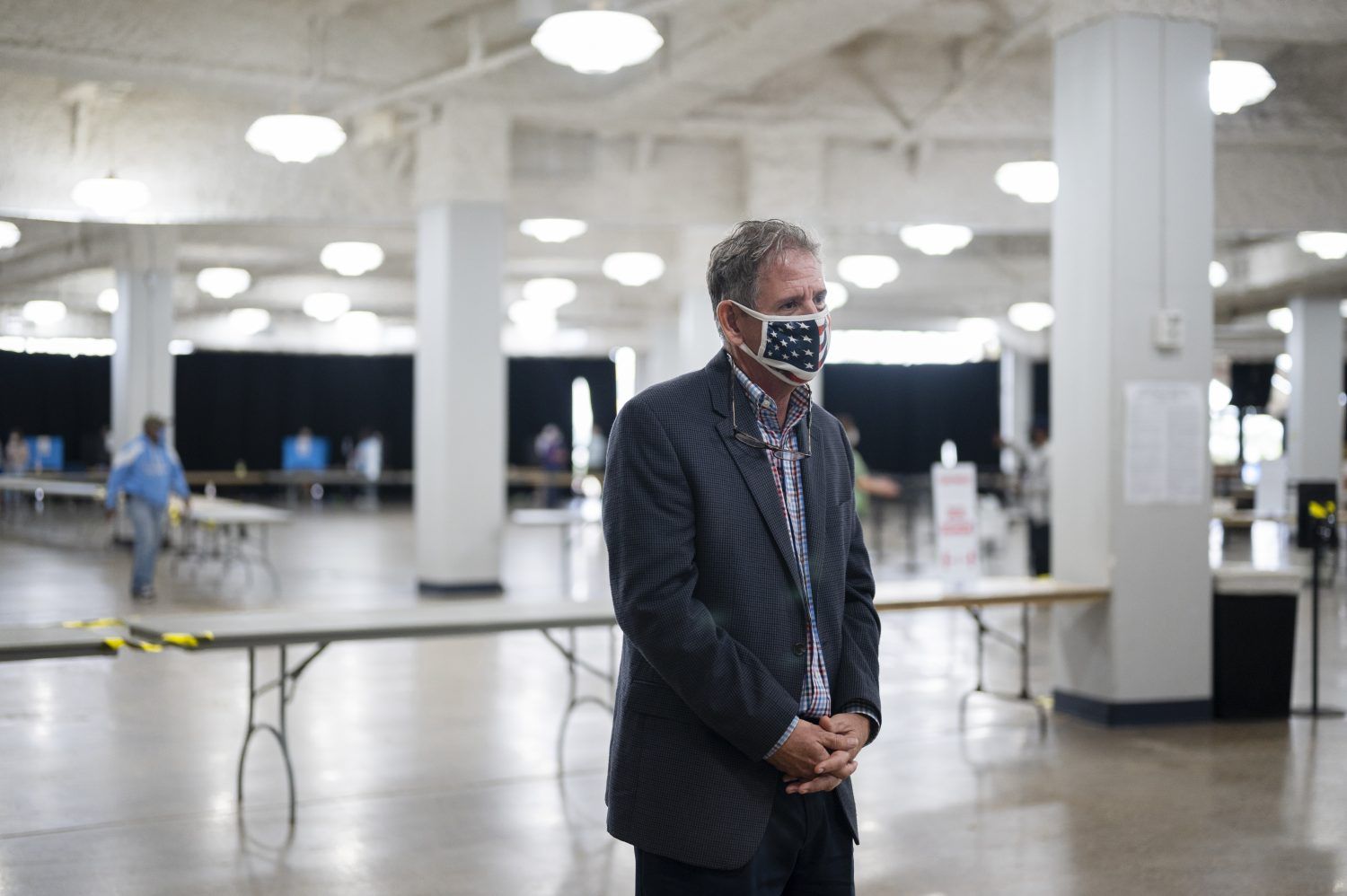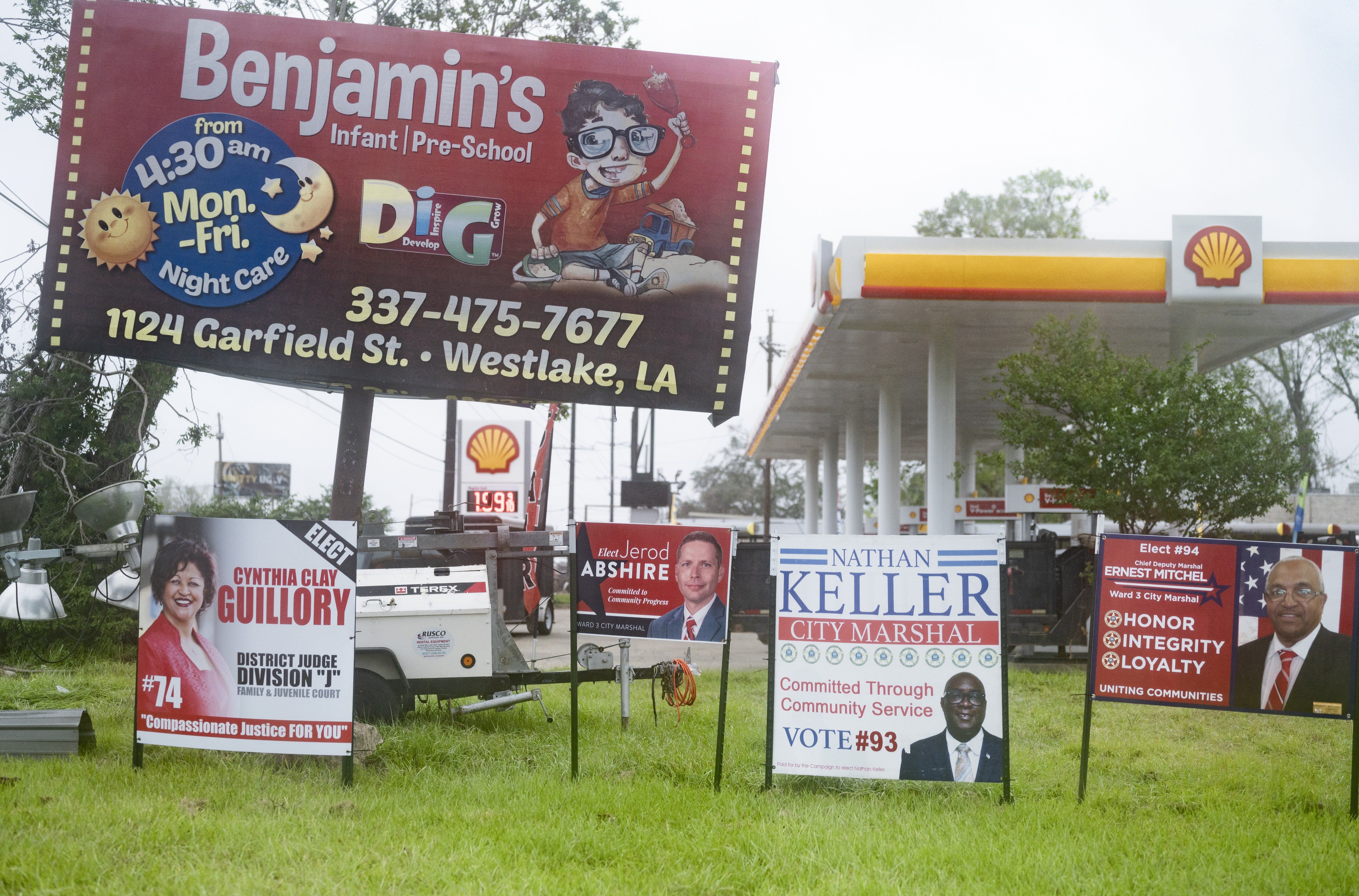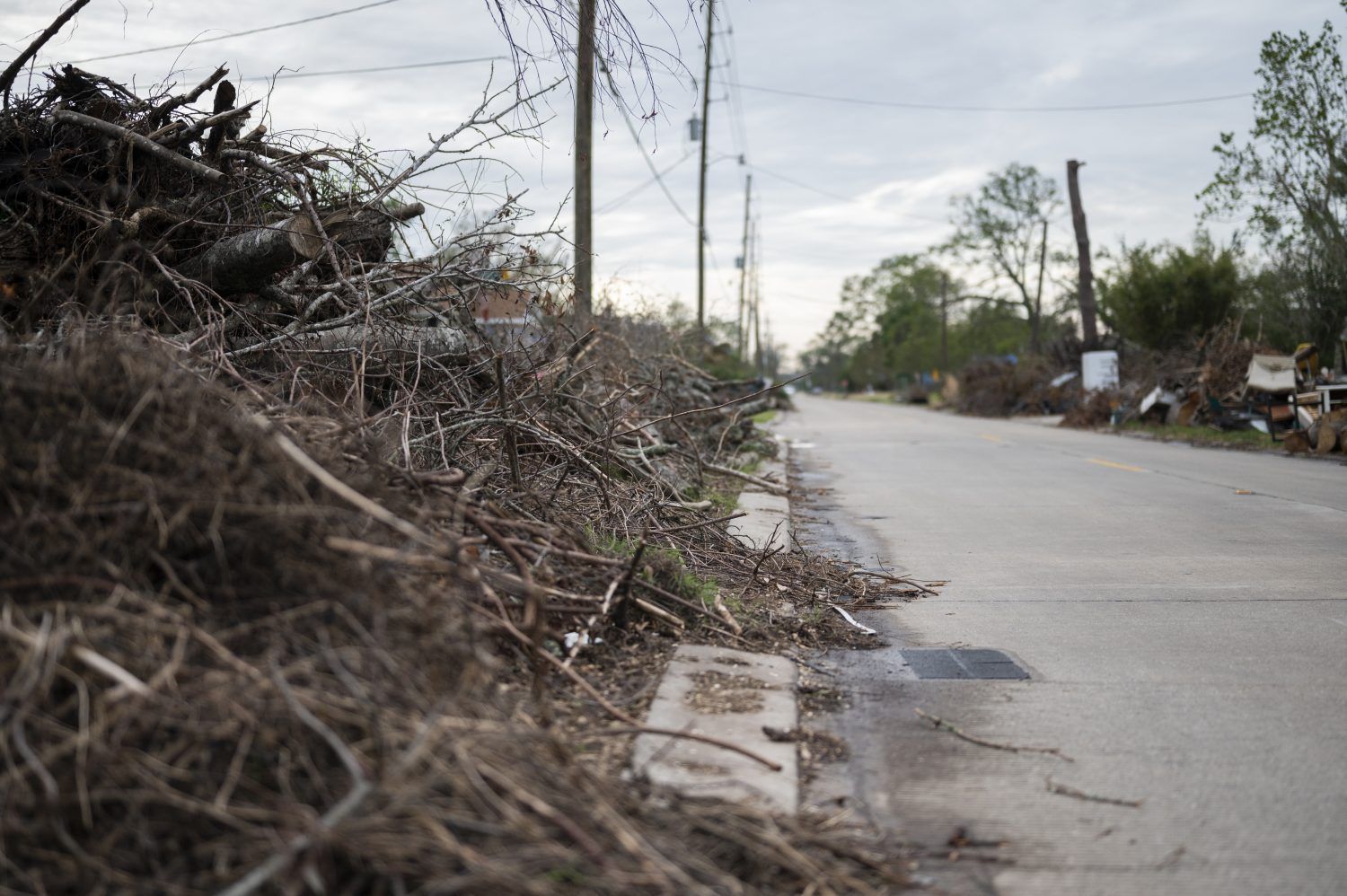On the first day of early voting in Louisiana, Tasha Guidry drove around Lake Charles to survey the wreckage from Hurricane Laura, which pummeled the city in August, and Hurricane Delta, which hit just a week before polls opened. The radio tower for 93.5 KPPM — the local gospel radio station she’s partnering with to broadcast local candidates’ debates — appeared to be intact, but the homes of many of her friends and family members weren’t.
Through a hot pink mask with “I can’t breathe” written on it in green cursive, Guidry wondered aloud how many people were still staying out of town after the storms. Too many to count. She’s tired of watching her neighbors decide not to vote, and worried they wouldn’t show up for the 2020 election. She recalled how low voter turnout was after Rita 15 years ago — down to 13% after many residents were displaced from Calcasieu Parish, where Lake Charles is located.
“They were already disenfranchised and down, and they had settled for whatever they had,” she said. “It broke my heart.”
But she also remembers what happened three years ago: A city council seat was decided by a single vote. “You need to vote because if you did, then your vote would count. It would mean something,” she said. “We can help change things. We can put people in offices that really care.”
Guidry, founder of Lake Charles Black Business Owners, said she is trying to give people “all the tools necessary so that they can make the decisions on their own” about the election. Representatives from state departments that manage elections and hurricane response, as well as recovery groups, have few answers about efforts to reach voters displaced by the storms, so she’s working tirelessly to coordinate debates for local races and reach voters via social media.
The election comes during the COVID-19 pandemic, which has disproportionately impacted Black Louisianans. COVID-19 cases are on the rise in Calcasieu Parish, and 222 people have died of the virus. About 32% of them were Black, although Black residents only account for a quarter of the population.
The recent hurricanes hit the area hard, and recovery has been slow. Hurricane Laura caused widespread wind damage to Lake Charles when it made landfall August 27. Six weeks later — while debris piles and blue tarped-roofs were still a common sight around town — Hurricane Delta dumped nearly a foot-and-a-half of rain on the city. Parish officials closed polling places, including schools and libraries, because of major damage, and communicating changes has been difficult because of internet outages and unreliable mail services. Thousands of people are still displaced from the storms, staying in hotels scattered across the state or with family and friends from Texas to Mississippi to Illinois.
“This is like a well-organized voter suppression that actually was caused by a natural disaster,” Guidry said.
Louisiana voters have three options: They can vote early, in person, October 16-27 (except Sundays); they can vote in person on election day, November 3; or they can vote by mail. The last option is limited to certain voters, however, including those who are temporarily living outside their parish or are at a high risk of COVID-19.
Lynn Jones, the clerk of court in Calcasieu Parish, said the chaos caused by the pandemic and back-to-back hurricanes has required his office to act quickly. “It’s the perfect storm, storm, storm,” he said.
Even before Hurricane Laura hit, Jones was considering consolidating polling places; many were too small to accommodate adequate social distancing. In Calcasieu Parish, 70% of election day precincts will be held at new locations, which can be found on the clerk’s website. There are three locations for early voting: the Lake Charles Civic Center (instead of the courthouse), the Calcasieu Parish library in Moss Bluff, and the Sulphur Law Enforcement Building.
Outside the Civic Center on Friday, Oct. 16, large signs on Lakeshore Drive directed voters inside. The building appeared mostly unscathed from storm damage, though surrounding trees and traffic signs were bent at odd angles. Voters competed for parking spaces with FEMA trucks and search-and-rescue teams from Oklahoma and Tennessee.
Jones said his office plans to station staff outside former polling places on election day to direct voters to the new locations, and that the office sent out notifications by mail to all registered voters in the parish. But mail delivery has been sporadic at best since Hurricane Laura. “I may get mail one time a week if I’m lucky,” Guidry said.
Guidry is concerned that the last-minute changes — and the fact that people may not have access to information about them — could further discourage Black voters from casting a ballot. “Unless you’re looking for the information, you don’t readily find it,” she said of the polling place re-locations. A recent investigation by Stateline and the Center for Public Integrity found that after historic floods inundated Baton Rouge in 2016, East Baton Rouge parish changed nearly 20 polling places, most of which had majorities of Black voters.
Guidry is plastering the Lake Charles Black Business Owners Facebook page, as well as her personal page, with details, hoping to reach voters who may not have seen them elsewhere. She feared that long lines at the consolidated early voting sites in Calcasieu Parish would discourage people, but lines moved quickly at the Civic Center in downtown Lake Charles on Friday, which has room for about 200 voters.
The short lines were not an evidence of low voter turnout, according to Jones. He said typically the Lake Charles early voting site sees 1,000 voters per day during early voting for a presidential election. The Civic Center has had an average of 2,100 early voters a day since Oct. 16.
Early voting over the next week is a viable option for people living in Lake Charles or nearby areas, but not for those living in rural areas or who are still displaced. Sandra Lazar, an election commissioner in Calcasieu Parish for 25 years, was pleased with the way early voting looked on Friday, but was concerned for people like her son, who is living at a New Orleans hotel.
“Some are just not gonna vote, and they’re mostly in the African American community,” she said.
The financial burden that comes from the COVID-19 pandemic, two evacuations, and rebuilding has left many residents with dwindling resources. Mass evictions at apartment complexes are common, and many homes have too much damage for people to live in them while they’re repaired. Unemployment spiked during the pandemic in the parish. As of August, the latest data available, unemployment was 8%. This spring, the Louisiana Budget Project found that while Black Louisianans make up only a third of the state’s workforce, they accounted for 40% of unemployment insurance claims in the state from mid-March to mid-April.
Advocates helping out in the region said many people — especially those who are still displaced — are focused on filling the most basic of needs, making sure they have food and water and a place to stay. “Who has money to make a trip just to vote?” said Ashley Shelton, executive director of the Power Coalition for Equity and Justice, a nonprofit that focuses on voter engagement and community organizing in Louisiana. The group has provided gas cards to hurricane evacuees so they can travel home to cast their ballot.
There are means to reach voters displaced while hurricane recovery is ongoing. After Hurricanes Katrina and Rita ravaged Louisiana in 2005, New Orleanians looking to vote in the city’s 2006 mayoral election could cast a ballot for that race at one of ten satellite early voting locations set up across the state, according to a Congressional Research Service Report from that year.
But officials had over six months to plan for the 2006 election, which was delayed. The special provisions outlined went through an approval process by the U.S. Department of Justice to assure they complied with the Voting Rights Act of 1965. Jones traveled to New Orleans to help, along with 70 volunteer election commissioners in Calcasieu Parish, because there were no elections in Calcasieu at the same time. But during a presidential election, every parish and county in the country is tied up running its own elections, with little bandwidth to help one another. Jones has always had a small team: only two part-time employees at the clerk’s office focus on elections. The pandemic has stressed budgets at state and parish agencies.
The last day to request absentee ballots is Oct. 30, although election officials are urging voters using this option to request their ballots via the secretary of state’s website as soon as possible. Ballots must be submitted by 4:30 p.m. on Nov. 2.
The Power Coalition was a plaintiff in a recent federal case against Secretary of State Kyle Ardoin and other government officials that resulted in a longer early voting period and more expansive COVID-19 protections for voters, according to the Louisiana Illuminator. In August, the secretary of state proposed an emergency election plan that would have required voters with COVID-19 to present a sworn statement from a doctor in order to receive a mail-in ballot.
At a press conference in Lake Charles on Friday, Ardoin said a task force organized by the Governor’s Office of Homeland Security and Emergency Preparedness (GOHSEP) provided pamphlets with absentee ballot request applications to evacuees at hotels, and that anyone who requested assistance through FEMA or the Red Cross was also mailed voting information.
Jones said these efforts are working, with his office seeing about double the amount of absentee ballot requests as they would normally during a presidential election. A portion are coming from hotels across Louisiana and Texas.
However, people who are displaced are moving frequently. The Department of Children and Family Services (DCFS), which oversees sheltering operations, and the Red Cross, which has taken over running hotels as shelters in the state, are consolidating shelter locations, according to DCFS secretary Marketa Garner Walters. This means some voters will likely not have a reliable address to receive a ballot.
One option could be to shuttle people from shelters and hotels to the polls in southwest Louisiana in order to provide voting access for those who lack transportation. But multiple state officials, including those in charge of shelters, did not have a plan for this. “I would recommend reaching out to election officials in Louisiana for more information on how they are helping their residents to vote,” said a Red Cross spokesperson.
When asked about resources for displaced voters, a spokesperson for FEMA Region 6 directed Southerly to the Louisiana secretary of state and the parish clerk of court.
When asked about reaching displaced voters in hotels, Jones also directed Southerly to the secretary of state. “We’re not directly contacting them,” he said of displaced voters. “We do not have that ability.”
Ardoin’s office did not respond to multiple calls and emails. GOHSEP also did not respond to a request for more information about the task force Ardoin noted in the press conference.
DCFS secretary Walters did not have an answer, either. The department has been swamped managing shelter operations for back-to-back storms, coordinating meal programs, and connecting evacuees with medical care. “I have not thought about what our responsibility to help people to get to vote is if they’re in a shelter,” she said.
Already busy running her own consulting and life-coaching company, as well as repairing her hurricane-damaged home, Guidry has managed to find time in the day to coordinate candidate debates for races down the ballot as well as explainers on statewide amendments. Despite a power outage across central Lake Charles during the debate for District Court Judge Division H the night before early voting began, the video now has 1,500 views.
During a typical election cycle, a variety of community groups would hold candidate forums, but the pandemic and hurricanes halted most of their efforts. Guidry wanted to wrap up the debates before early voting began, but Hurricane Delta threw a wrench in that plan. Candidates evacuated and power was out for days. She’s back up and running, though, with help from the co-founder of Black Business Owners, Nwora Fairley.
Voters can visit the group's Facebook page to watch the debates if they missed live versions. Standing across the street from the middle school in north Lake Charles where her mother taught for nearly four decades — which has lost many days of learning this year due to closures — Guidry spoke of her lifelong love of educating others.
“If I can encourage somebody to vote — and I don’t want them to vote for who I want them to vote for — I want to give them the information so that they can make their own decisions,” she said.
Southerly’s Gulf Coast correspondent Carly Berlin is reporting extensively on hurricane recovery in southwest Louisiana. If you have been affected by Hurricanes Laura and/or Delta, fill out this confidential tip form.
